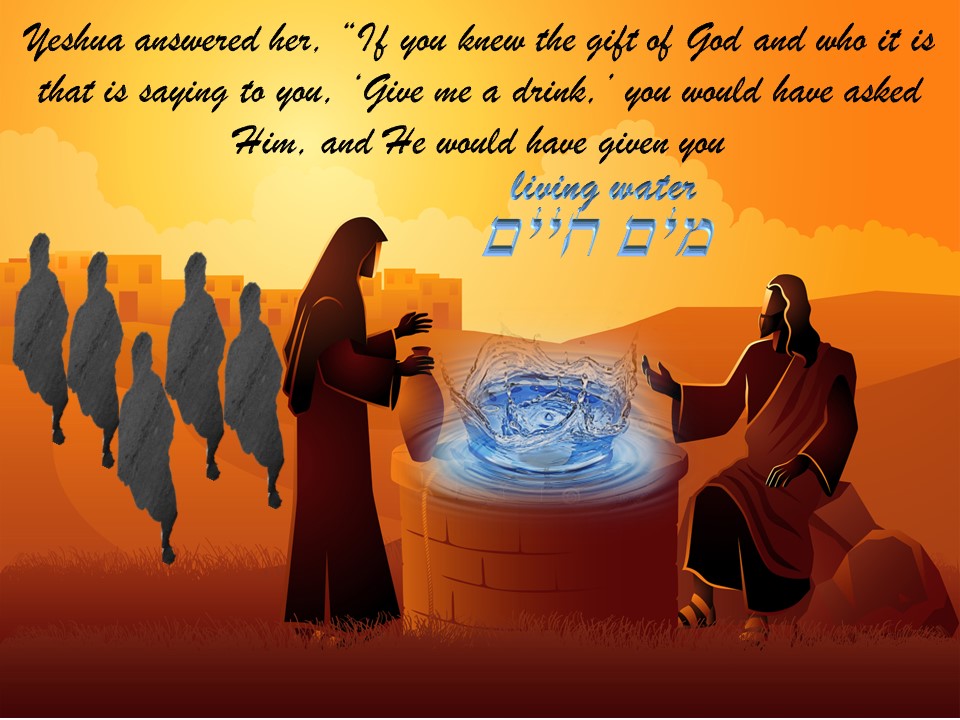This passage is what I consider to be the most powerful message of Shavuot. We know that Jesus celebrated each of the feasts of God in Leviticus 23, since He was under the Law. The gospels tell us what He was doing during and teaching one of those years, at the time of the feast of Shavuot. On that occasion, He taught and trained the disciples about of the work of the ekklesia (church) that was to be born. It is extraordinary that He gave the teaching in what was considered then to be a foreign territory to the Jewish people. Surely, this was to prepare the disciples for the worldwide work of the new institution to come.
The teaching is found in the fourth chapter of John when Yeshua was in Samaria. What was Jesus doing in Samaria at Shavuot? He was leaving Judea to go to Galilee, but Jews would not usually go through Samaria. Religious Jews would take the longer route through Perea to the east because they despised the Samaritans, who also despised the Jews. These groups were always at odds with each other.
Divine Appointment in Samaria
Yeshua took a path to stop by Jacob’s well. The meeting they had was inscribed from eternity past. Notice the great emphasis John puts on this meeting in Samaria.
But He needed to go through Samaria. John 4:4 I think this is the first and maybe the only time when the Messiah needed something. What was it? The Greek word is translated elsewhere as must or ought to – something that was necessary to do. So why was it so necessary and pressing for the Messiah to go to Samaria? Surely Jesus saw the urgency and necessity of going through Samaria because one individual, one woman, was ready to be saved. It was because this woman, a Samaritan, who was despised in Jewish society and even in the eyes of her own people, was about to be grafted into the olive tree, into the family of God. The time for that one soul to meet her Creator had come, and God made it his business to be there at the proper time – and He was.
How do we know that this happened at the time of Shavuot? See what Yeshua told the disciples after they witnessed the salvation of this woman. Do you not say, ‘There are yet four months, and then comes the harvest’? Behold, I say to you, lift up your eyes and look on the fields, that they are white for harvest. John 4:35. Which harvest was Yeshua referring to?
The timing is about four months before the fall harvest, making the time of this verse just after the feast of Shavuot. Yeshua left Judea where He must have celebrated the feast. Right away, to prepare the disciples for the spreading of the Gospel to the nations, He brought them to witness the salvation of a non-Jewish woman in Samaria. And so, for the new ekklesia, and for us, this harvest had begun; it is the harvest of souls, which the disciples will soon undertake. Here you can see how God so loved the world. God has no needs, yet He allowed Himself to be pressed by His desire to save.
A Blessing to All Nations
Note where in Samaria the encounter happened. It took place in Sychar. Why is Sychar important? So He came to a city of Samaria called Sychar, near the parcel of ground that Jacob gave to his son Joseph; and Jacob’s well was there. So Jesus, being wearied from His journey, was sitting thus by the well. It was about the sixth hour. John 4:5-6. That is a lot of information for just Sychar, which shows us that there is some significance in it. Sychar is the Hebrew for the city of Shechem, the first place Abraham stopped in the promised land after he received the Abrahamic Covenant from God, which promises the blessing of salvation to the nations through Israel and the Messiah. That was when the Lord appeared to him again and confirmed His covenant in saying:
“To your descendants I will give this land.” So he built an altar there to the LORD who had appeared to him. Genesis 12:7 Note the last words of the Abrahamic covenant the first time it is mentioned. And in you all the families of the earth will be blessed. Genesis 12:3b. We go from Abraham to Jacob the father of the 12 tribes of Israel. The work of Israel really began with the Samaritan woman. Yeshua Himself sets the way and the standard by which the Word was to issue forth. From the Feast of Shavuot, He leaves Jerusalem and finds His way to Samaria. He begins to fulfill the role of the Light to all the nations. This same procedure would then continue with the work of the Holy Spirit through the Body of Messiah.
The Outcast Finds Grace
The encounter, the story, and the conversation are very moving. Let us just notice a few things. First, before the encounter, we are warned and prepared to expect that something great or out of the ordinary is about to happen. In Greek it says: Comes a woman out of Samaria to draw water. Jesus said to her, “Give Me a drink.”
Now, how can this woman come out of Samaria when she was right in Samaria? It is as if I were to leave the sanctuary and say, “I am coming out of Montreal.” What would that mean, when in fact I am in Montreal, either inside or outside of the sanctuary? Perhaps, the word coming out of Samaria, conveys to us that this individual was coming out of from her old life to meet the new one, to meet the Messiah, the Savior. Wherever we are, we need to come out of Samaria. We need to go to God and leave our old life behind.
Second, see the type of individual this woman was. We see that the woman came to draw water at about the sixth hour (John 4:6), which corresponds to noon, when the sun was hot. Usually, they would draw water either in the cool of the morning or evening so why did this woman go when no one was there? That indicates that the woman may have been an outcast and the reason could be seen in what she told Yeshua in John 4:16-17. It is a great section as Jesus tries to bring this woman to confess so that He could bless her and save her. Look at how He does it. Jesus said to her, “Go, call your husband, and come here.” The woman answered and said, “I have no husband.” Jesus said to her, “You have well said, ‘I have no husband,’ for you have had five husbands, and the one whom you now have is not your husband; in that you spoke truly.”
First, imagine, she had 5 husbands and was living in sin with another who was not her husband. Would you speak to a woman like that? Jesus did! He did because He knew her wounded heart. Jesus knew very well that she did not have a current husband, so perhaps He wanted an acknowledgment, an admission, or a confession so He could show her grace and heal her spiritually. She did not hide her faults from God. She confessed and was saved.
This episode teaches us a lot and bids us to arm ourselves with prayer before a judgment is brought against someone.

View full Sermon: Shavuot – Feast of Pentecost
